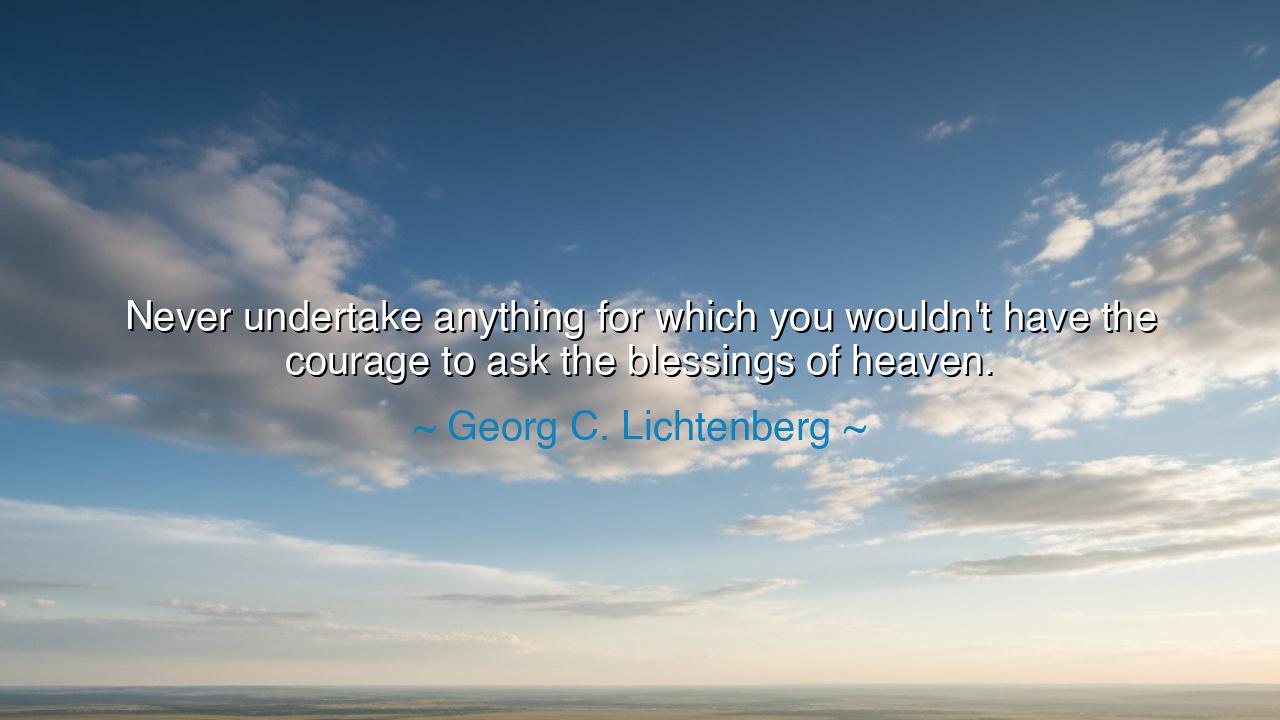
Never undertake anything for which you wouldn't have the courage
Never undertake anything for which you wouldn't have the courage to ask the blessings of heaven.






In the sage words of Georg C. Lichtenberg, the philosopher and wit of 18th-century Germany, we encounter a profound instruction for the conduct of life: “Never undertake anything for which you wouldn't have the courage to ask the blessings of heaven.” These words resonate with the timeless truth that human action, when guided by conscience and moral vision, must be measured against the highest standard — the judgment of what is right, just, and sacred. Lichtenberg reminds us that courage and integrity are inseparable: one cannot act boldly without first weighing the righteousness of the endeavor and the accountability it entails.
The origin of this insight lies in Lichtenberg’s life as a scientist, philosopher, and observer of human folly. Known for his aphorisms and sharp wit, he often reflected on the alignment of human ambition with ethical principle. He recognized that men frequently embark upon enterprises driven by desire, vanity, or expedience, without considering whether their actions are worthy of divine or moral approbation. His counsel urges reflection: the act itself must be worthy of the highest blessing, for only then does courage become noble and just, rather than reckless or self-serving.
The meaning of this quote is deeply moral and spiritual. To undertake an action without the courage to seek the blessings of heaven is to risk both dishonor and misfortune, for it signals that the soul itself doubts the righteousness of the act. True courage, therefore, is not the absence of fear, but the presence of moral clarity — the conviction that one’s choices align with universal principles and the greater good. Lichtenberg teaches that courage untethered from virtue is hollow, but courage guided by conscience is profound, enduring, and capable of transforming the world.
History offers vivid examples of this principle. Consider Socrates, the philosopher who accepted the death penalty rather than flee or compromise his beliefs. He undertook no action without reflection upon its justice, and in doing so, he displayed the courage to act with moral integrity, even under mortal threat. Socrates’ life embodies Lichtenberg’s wisdom: every action must be aligned with conscience and principle, worthy of divine sanction, for only then is courage truly noble.
Even in the quiet rhythms of ordinary life, this insight resonates. The parent who teaches their children truth, compassion, and honor acts with courage that would withstand the scrutiny of the heavens. The teacher who guides students with patience, insight, and fairness undertakes their work with moral courage. The citizen who defends justice, even when unpopular, acts with the courage that Lichtenberg extols. In each instance, the measure of courage is the alignment of action with conscience and virtue, the willingness to ask for blessings that reflect righteousness.
The lesson in Lichtenberg’s words is both practical and transcendent. Before embarking upon any significant undertaking — whether in public service, personal ambition, or intimate relationships — one must ask: “Would I have the courage to seek divine blessing for this act? Would it honor the principles of truth, compassion, and justice?” If the answer is no, hesitation is warranted. If the answer is yes, courage is affirmed, and action may proceed with integrity. In this way, moral reflection becomes the foundation of true courage.
Moreover, this wisdom teaches us the interplay of humility and boldness. Courage is not the arrogant assertion of will, but the humble acknowledgment of moral responsibility. To undertake an act worthy of heaven’s blessing requires self-knowledge, restraint, and reverence, ensuring that bravery does not devolve into folly or harm. Lichtenberg reminds us that the highest courage is guided, disciplined, and accountable — it does not act in isolation from conscience or principle.
So, my child, take this counsel into your heart: measure every endeavor against the standard of what is right and worthy, and proceed only with the courage to seek the blessings that align with virtue. Let your actions be deliberate, principled, and moral, for in this manner, courage becomes not a fleeting display of strength, but a living testament to the dignity of the soul. Walk with integrity, act with conviction, and know that the blessing of heaven is both a guide and a witness to every noble undertaking.






AAdministratorAdministrator
Welcome, honored guests. Please leave a comment, we will respond soon